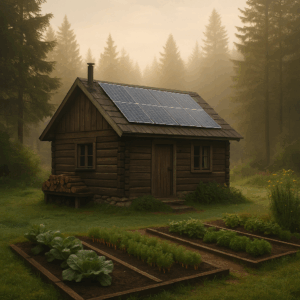From Modern Dependency to Freedom: A Guide to Simple and Intentional Living
In today’s fast-paced world, many are seeking a return to a simpler, more intentional way of living. This journey from modern dependency to wild freedom offers the promise of a sustainable life that is not only fulfilling but also empowering. Imagine reclaiming your independence with practical tools for living that enhance your resilience and peace of mind. Our supportive community is here to guide you every step of the way, helping you embrace a lifestyle rooted in simplicity and freedom. Whether you’re a curious beginner or a seasoned homesteader, this guide will serve as your pathfinder to intentional living, offering clarity and calm as you navigate towards a more meaningful existence.
Embracing Simple Living
Simple living is about paring down to focus on what truly matters. This section explores the benefits of minimalism and how to cultivate intentional living practices.
Benefits of a Minimalist Lifestyle
Minimalism offers a path to clarity and contentment. By reducing physical and mental clutter, we create space for what truly enriches our lives.
A minimalist lifestyle can lead to reduced stress and increased focus. When we’re not overwhelmed by possessions or commitments, we can dedicate our energy to pursuits that align with our values.
Financial freedom is another key benefit. Consuming less means spending less, which can lead to increased savings and reduced debt. This financial cushion provides peace of mind and opens up opportunities for experiences over things.
Robin Greenfield’s simple living guide offers practical insights into the benefits of minimalism, demonstrating how less can truly be more.
The Path to Intential Living
Intentional living is about making conscious choices that align with our values and goals. It’s a journey of self-discovery and purposeful action.
To begin, reflect on your core values. What matters most to you? Once you’ve identified these principles, you can start making decisions that honor them.
Next, set clear intentions for different areas of your life – career, relationships, personal growth. These intentions act as a compass, guiding your daily choices and long-term plans.
Practice mindfulness to stay present and aware of your choices. This heightened awareness helps you make decisions that truly serve your well-being and goals.
Regular reflection and adjustment are key. As you grow and change, your intentions may shift. Embrace this evolution as part of your intentional living journey.
Discovering Wild Freedom
Wild freedom is about breaking free from societal constraints and living life on your own terms. This section explores how to reclaim independence and embrace sustainable practices.
Reclaim Independence with Off-Grid Choices
Off-grid living represents the ultimate form of independence, freeing you from reliance on traditional systems and fostering self-sufficiency.
Energy independence is a cornerstone of off-grid living. Solar panels, wind turbines, and micro-hydro systems can provide clean, renewable energy. These technologies not only reduce your carbon footprint but also protect you from power outages and rising utility costs.
Water self-sufficiency is another crucial aspect. Rainwater harvesting systems, coupled with filtration and storage solutions, can meet your water needs. Greywater recycling further optimizes water usage, turning waste into a valuable resource.
Food independence through gardening and small-scale farming connects you directly with your sustenance. This not only ensures a fresh, organic food supply but also develops valuable skills and a deeper appreciation for nature’s cycles.
The Life Off Grid blog offers a wealth of information on reclaiming independence through off-grid choices.
Exploring Sustainable Life Practices
Sustainable living practices help us tread lightly on the Earth while enriching our lives. These practices often align with off-grid principles but can be adopted in any living situation.
Reduce, reuse, and recycle become more than just slogans when living sustainably. Mindful consumption, upcycling, and proper waste management become integral parts of daily life.
Embracing renewable energy, even on a small scale, can make a significant impact. Solar-powered chargers or small wind turbines can be starting points for those not ready for full off-grid living.
Sustainable transportation choices, like biking or carpooling, not only reduce your carbon footprint but can also foster community connections and improve personal health.
This sustainable living action guide provides practical steps for incorporating these practices into your life.
Building a Supportive Community
Community is vital in the journey towards simple and intentional living. This section explores practical tools and ways to connect with like-minded individuals.
Practical Tools for Living Simply
Simple living doesn’t mean primitive living. There are numerous tools and technologies that can support a minimalist, sustainable lifestyle.
Energy monitoring devices help you understand and optimize your consumption. Smart thermostats and LED lighting can significantly reduce energy use without sacrificing comfort.
Water-saving tools like low-flow showerheads and dual-flush toilets conserve this precious resource. Composting toilets take it a step further, turning waste into valuable soil.
In the kitchen, tools like pressure cookers and solar ovens can reduce energy use while preparing nutritious meals. Food dehydrators and canning equipment support food preservation, reducing waste and increasing self-sufficiency.
For more ideas on practical tools for simple living, check out this YouTube playlist.
Connecting with Like-Minded Individuals
Building a community of like-minded individuals can provide support, inspiration, and shared resources on your journey to simple and intentional living.
Online forums and social media groups are great starting points. Platforms like Reddit have active communities dedicated to simple living, minimalism, and sustainability.
Local meetups and workshops offer opportunities for face-to-face connections. Look for events focused on skills like gardening, renewable energy, or minimalist living.
Collaborative projects, such as community gardens or tool-sharing initiatives, can foster strong bonds while supporting sustainable practices.
Consider joining or starting an eco-village or intentional community. These offer immersive experiences in sustainable, community-focused living.
For more ideas on building a supportive community, visit A Sustainably Simple Life and explore their resources on community building.
Remember, the journey to simple and intentional living is personal and unique. As this book on living sustainably suggests, there’s no one-size-fits-all approach. Embrace the process, learn from others, and create a lifestyle that truly resonates with your values and aspirations.



